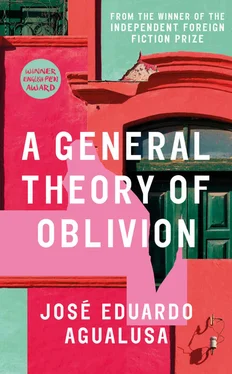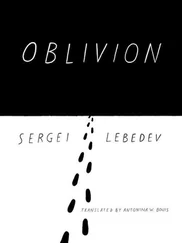‘This is getting ugly, man. Let’s get out of here!’
Back in Luanda, sat at a bar table, Monte was summarising the humiliating defeat in between gulps of beer, resorting to an image that was expressive, if inelegant:
‘We were run out of there like dogs. I swallowed so much dust I’ve been crapping bricks ever since.’
IN WHICH A DISAPPEARANCE IS CLEARED UP (ALMOST TWO), OR HOW, TO QUOTE MARX: ALL THAT IS SOLID MELTS INTO AIR
Magno Moreira Monte had woken up, on a lightless morning, feeling like a river that had lost its source. Out there, a gentle rain was dying. His wife was combing her hair, in panties and sandals, sitting on the bed.
‘It’s over,’ said Monte. ‘I can’t take it any more.’
Maria Clara looked at him with a mother’s calm:
‘That’s just as well, my love. So we can be happy now.’
That was in 2003. The new directions being taken by the party appalled him. He didn’t approve of the abandoning of the old ideals, the surrender to market economics, the cosying up to capitalist powers. He quit the intelligence services and restarted his life as a private detective. Clients sought him out, on the advice of common friends, in search of information about competing firms, substantial thefts, missing persons. He received visits, too, from desperate women, looking for evidence of their husbands’ betrayals, and jealous husbands, offering him considerable sums to watch their wives. Monte didn’t accept these kinds of commissions, which he called, contemptuously, ‘bed business’. He would recommend other colleagues.
One afternoon, the wife of a well-known businessman appeared in his office. She sat down, crossed and uncrossed her magnificent legs, like Sharon Stone in Basic Instinct , and shot out in a single breath:
‘I want you to kill my husband.’
‘What?!’
‘Slowly. Very slowly.’
Monte leaned forward in his chair. He looked at her in silence for a long moment, expecting to break her. The woman didn’t lower her eyes.
‘I’ll give you a hundred thousand dollars.’
Monte knew the businessman in question, an unscrupulous opportunist who had begun to fill his pockets back in the Marxist days, stealing, here and there, from public works.
‘It’s a lot of money for such a small job.’
‘So you accept?’
‘Why do you want to kill him?’
‘I’m fed up with his betrayals. I want to see him dead. Do you accept?’
‘No.’
‘You don’t accept?’
‘No. I don’t accept. I’d kill him without the slightest remorse — with a certain amount of pleasure, even, especially if it’s slowly, but you haven’t given me the proper motive.’
The woman left, furious. Weeks later the newspapers reported the businessman’s death. He had been shot, in his car, while resisting an attempted robbery.
Monte couldn’t help but smile when he heard occasional comments about the disappearance of Simon-Pierre Mulamba. People who saw him smiling took it badly. They believed that he, an obstinate Marxist, a sceptic by nature and by training, was smiling at popular superstition. At the time, he had been annoyed at the failure of the operation. He could not bear mistakes, his own or other people’s, even though the final result of the whole mix-up had pleased him. Finally, he resigned. ‘That was the straw that broke the back of my infinite patience,’ he explained to a friend. The war had ended. In the hotels of Luanda, businessmen from Portugal, Brazil, South Africa and Israel all rubbed shoulders, in search of quick money in a country going through a process of frantic reconstruction. From upstairs — some lavish, air-conditioned office — the order had come to silence a journalist, Daniel Benchimol, who was a specialist in disappearances. Benchimol had spent weeks questioning pilots, mechanics, businessmen, whores, travelling salesmen, opposition politicians and government ones, too, all kinds of people, about the vanishing of a Boeing 727. The plane vanished at daybreak, forty-five tons of solid metal, a wonder that nobody could explain.
‘All that is solid melts into air,’ muttered Monte, thinking about Marx, and thinking, like Marx, not about planes but about the capitalist system, which there in Angola, thriving like mould amid ruins, had already begun to rot everything, to corrupt everything and, thus, to bring about its own end.
Monte knew the journalist. He thought him an honest guy, even idealistic, in a field where many others chose to sell their souls to the Devil. The reports Benchimol put his name to, which were tempered by just a touch of humour, irritated and troubled the new bourgeoisie. He was descended from Moroccan Jews who’d settled in Benguela in the middle of the nineteenth century, subsequently becoming Christianised and mulattised. His grandfather, Alberto Benchimol, a much-loved and well-respected doctor, had belonged to the ‘Kuribeka’, the name given to Angola’s freemasons. The word comes from the Ovimbundu, and means to introduce oneself or offer oneself. The Kuribeka was established around 1860, with lodges in Benguela, Catumbela and Moçâmedes, and seems to have inspired a number of uprisings of a nationalist bent. The young man had inherited his grandfather’s openness and directness, qualities Monte admired. When he received the order to silence him, the detective couldn’t contain his disgust:
‘This country’s turned inside out. The just pay for the sinners.’
This observation, made out loud in a confident voice in front of two generals, did not go down well. One of them straightened up:
‘The world has changed. The party knew how to progress along with the world, to modernise, and that’s why we’re still here. You ought to give some thought, comrade, to the historical process. Study a bit. How many years have you been working with us? Forever, right? I think it’s too late for you to turn against us.’
The second general shrugged:
‘Comrade Monte likes being provocative. He’s always been like that, an agent provocateur. Just his style.’
Monte got into line. Obeying orders. Giving orders. That was all a life added up to, after all. He had the journalist watched. He discovered that every Saturday Benchimol would hire a bungalow at a small lodge in Barra do Kwanza, to meet the wife of a well-known politician. He would arrive around four. The lover would arrive an hour later, and she never stayed long. The man, though, allowed himself to linger till morning, have some breakfast, and only then would he return home.
It’s routines that give the prey away.
One of Monte’s best friends collected snakes and palm trees. Uli Pollak had disembarked in Luanda just a few months after Independence, on loan to the Angolan revolution from the Ministerium für Staatssicherheit. He married a woman from Benguela fifteen years his junior, with whom he had two children, and, after the collapse of the GDR, he requested and was granted Angolan citizenship. A discreet man of few words, he had earned his living producing and dealing in porcelain roses. He had built a house next to Stag Hill, with a round veranda, as vast as a plaza, almost all of it overlooking the water. It was there, as the sea swallowed up the darkness, that he received his friend, the two of them sitting outside in comfortable wicker chairs. They were drinking beer. They discussed the situation in Angola, the invasion of Iraq, the chaotic state of the city. Uli waited till the darkness had overtaken everything:
‘You didn’t come here to talk about the state of the traffic.’
‘You’re right. I need one of your snakes.’
‘I knew the day would come when you’d show up to ask for something of that sort. I like my snakes. They aren’t weapons.’
Читать дальше












